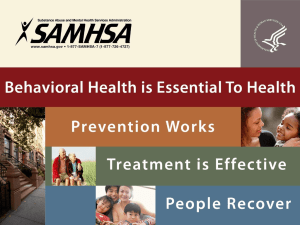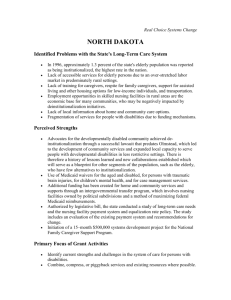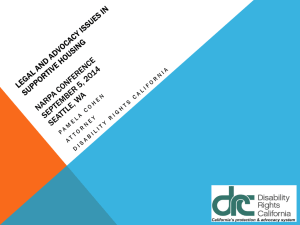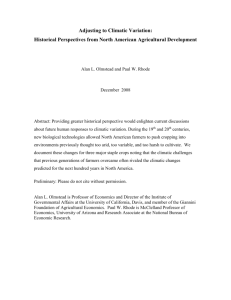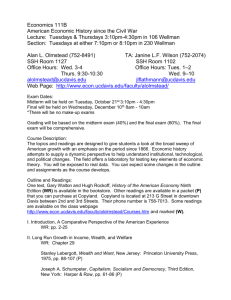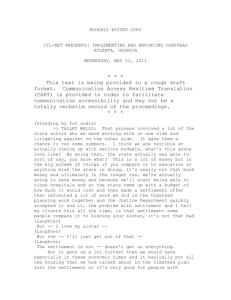OCSS Jan 21 2016 Long Road Home How Do we Exand our Efforts
advertisement
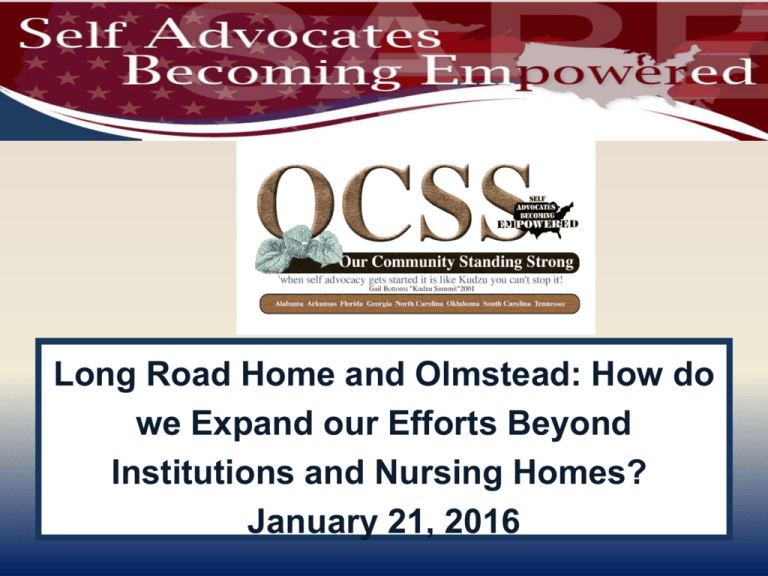
Long Road Home and Olmstead: How do we Expand our Efforts Beyond Institutions and Nursing Homes? January 21, 2016 WELCOME Reminders: • Please mute your device once you join the call • Remember to raise your hands for questions or write a message in text box • We will give everyone a chance to ask questions at the end of the presentation WELCOME Reminders: • If you are using more than one device for this webinar, please do not place next to each other, to reduce echoing or feedback. • Make sure your speakers are turned on. THE PURPOSE OF THIS WEBINAR Participants will learn about expanding long road home to address other segregated settings such as group homes, sheltered workshops, and family homes. Co-Presented by People First of Georgia Supported by The Georgia Advocacy Office Cheri Mitchell LONG ROAD HOME The Olmstead Decision Olmstead Decision History It all started with Two ladies who wanted to live in the community instead of an institution. Lois Curtis and Elaine Wilson, who had mental illness and developmental disabilities, and were voluntarily admitted to the psychiatric unit in the State-run Georgia Regional Hospital. Following the women's medical treatment there, Lois and Elaine was ready to move into the community. However, the women remained confined in the institution, each for several years after the initial treatment was concluded. They filed suit under the Americans with Disabilities Act (ADA) for release from the hospital. Olmstead Decision History Sue Jamieson, who was an attorney at the Atlanta Legal Aid Society, filed a lawsuit on behalf of Lois (and then later added Elaine) for supports to be provided in the community. The lawsuit, which is known as “the Olmstead decision,” ended up going to the highest court in the country, the United States Supreme Court. The name Olmstead comes from the name of the Defendant in the case, Tommy Olmstead, who was the Commissioner of the Georgia Department of Human Resources. Olmstead Decision History The Supreme Court agreed with Lois and Elaine. The Court found that under the Americans with Disabilities Act, also known as “the ADA,” it is against the law for the state to discriminate against a person based on his or her disability. The Court said that the state discriminated against Lois and Elaine by requiring them to live in a mental health hospital. It should have instead provided services for them in the community. By confining them in the hospital, the state was segregating them by requiring them to live with others with disabilities. The Court said that people with disabilities like Lois and Elaine have the right to receive the treatment they needed in an integrated setting if that is what they want Olmstead Decision History In 1999, the Supreme Court decided in Olmstead v. L.C. that people with disabilities have the right to live in the “most integrated setting,” meaning the community. Even with the support of the Supreme Court, many people with disabilities are still trapped in segregated settings like institutions and nursing facilities. Olmstead Decision Olmstead Decision “most integrated setting,” meaning Living in the community. LONG ROAD HOME History Now, every year across the country, the disability community comes together to host Long Road Home events to raise awareness. Long Road Home was the brainchild of Kate Gainer, who, with People First of Atlanta, started Long Road Home in 2004. Long Road Home events are an opportunity to have crucial conversations about whether your state is “Olmstead compliant” and to build real collaborations within the disability community. It's simple: Long Road Home is a civil rights movement. People should not be locked away or segregated because they have a disability. LONG ROAD HOME What is Long Road Home and why is it important? LONG ROAD HOME • Long Road Home is a celebration of Disability Civil Rights. • It is to celebrate the Olmstead Decision, which says that people with disabilities have the right to receive services in the “most integrated setting,” meaning the community. This event is to raise community awareness about that right. LONG ROAD HOME In Georgia we collaborate with many organizations to do our Long Road Home events The Georgia Advocacy Office (GAO), the Protection and Advocacy system for Georgia Atlanta Legal Aid Society (ALAS) Georgia Council on Developmental Disabilities (GCDD) Center for Leadership in Disability at Georgia State University (CLD)The National Federation of the Blind of Georgia (NFO of GA)Georgia Mental Health Consumer Network (GMHCN) LONG ROAD HOME We have partnered with businesses and churches, too We will partner with anyone who supports people with disabilities to live in the community What is a Long Road Home event? LONG ROAD HOME Long Road Home events can take many forms. Some past events have included rallies at State Capitol buildings, marches, public forums, and lunch-and-learns. Your event can take any shape, but remember that the goal is to bring attention to what the Olmstead Decision is and the fact that there are people with disabilities waiting to be free to have good lives: Real Lives, Real Homes, Real Jobs, Real Education, and Real Votes! LONG ROAD HOME We encourage all events to include two things: 1. I am Olmstead Freedom stories. Freedom stories are told by and about people who have moved out of nursing facilities and institutions and are now living successfully and happily in their community. 2. Voter registration and voter education. We have a Long Road Home voter flyer you can print and use. How to Organize a Long Road Home event LONG ROAD HOME 1. Arrange a committee and pick a chairperson. The local chairperson will need to contact the national chairperson, Cheri Mitchell, and let her know you will be participating. The national chairperson is available to any group that is interested in more information or needs assistance in planning an event. 2. Set a planning meeting date once a month so everyone can get it on their calendar. 3. Discuss what type of event you want to have: a march, a rally at the State Capitol, a lunch-andlearn, or something totally new? It is up to you! 4. Decide where the best place is to host the event. Keep accessibility in mind. LONG ROAD HOME 5. Decide when you want to hold your event. We suggest this should happen in June, but it is up to you. June is the anniversary of the Olmstead Decision. You may even want to have more than one event. 6. Make a to-do list. At the end of each meeting, list what needs to be done and who is doing it. 7. Turn in your Long Road Home information to the national chairperson for it to be posted on the Long Road Home website no later than May 30 of every year. Example Agenda for your event LONG ROAD HOME • • • • • • • • Welcome by Cheri Mitchell What is Olmstead? presented by Lois Curtis Olmstead Now by Tally Wells Freedom Story by Yaz Abdula Children’s Freedom Initiative by Katie Chandler The Future of Olmstead by Ruby Moore Open Mike for Freedom Stories Close by Bernard Baker, President of PF of GA LONG ROAD HOME Long Road Home website: www.peoplefirstofga.com – Click on Long Road Home I am Olmstead website: http://www.olmsteadrights.org/iamolmstead/ LONG ROAD HOME Contact National Chairperson Cheri Mitchell 150 East Ponce de Leon Ave., Suite 430 Decatur, GA 30030 cherimitchellg@gmail.com or cmitchell@thegao.org (404)885-1234, (800)537-2329, or (404) 849-8209 Co-Presented by Chaqueta Stuckey Expanding Long Road Home Why is it important? EXAMPLES OF SETTINGS THAT ISOLATE PEOPLE FROM FREEDOM Sheltered Workshop PARKS SCHOOLS Group Homes HOSPITALIZATIONS Living at home w/Relatives/Parents What can we Do? • Allow voices to be heard, Speak up! • • • • Take Action Continue to collaborate (Events) Share Stories Take Risk Promote the FAB Life CHOOSE Freedom over SECLUSION Accomplishments over STRESSORS Believe over FAILURE OCSS STATES QUESTIONS AND ANSWERS STATE QUESTIONS 1. Have you sponsored a long road home in your state? 2. How could you expand beyond institutions and nursing homes to other segregated settings? ALABAMA COMMENTS • Events to closing institutions • Working with the Department of Mental Health on nursing homes, going to meetings to talk about group rules, there are institutionalized rules (CMS) for all group homes • Do what’s right, if you have lived in one • Employment First and getting out of segregated or least restrictive settings • ADA celebration event • YEL training (Olmstead and Long Road Home) ARKANSAS COMMENTS • Has a lot of institutions and working on the issue • Restraint report from the DD centers to make improvements • Sheltered workshop are on our radar • Monitoring HCBS and working on the state plan and improving services • Has done Long Road Home in the past FLORIDA COMMENTS • Did not participate in call GEORGIA COMMENTS • Putting a museum exhibit together • Displayed artwork MISSISSIPPI COMMENTS • Settlement Act to get people out of institutions • Bridge to Independence program to get people out of nursing homes and get providers and get access to community living • Employment First (Act) competitive with services, working on closing workshops • Hearing about seclusion and restraints (working on) • Workforce Act working with VR and Dept of Ed and self advocates to get young people to have an awesome life after high school, meeting next month • PTI work with the UCEDD and our youth group on summits where they learn about disability history and how to access services to live independently NORTH CAROLINA COMMENTS Have done events in the past OKLAHOMA COMMENTS • At the conference, developed a strategic plan because OK become a new state to be institution free • The plan shows how OK is going to help people move into their ow communities • Made a commitment to do Long road Home this year SOUTH CAROLINA COMMENTS Self advocates are part of Person Center work with HS Providers (CB waiver) Has not done a Long Road Home event Will talk with the group to create an event And develop a PP to present to advisory Council in February Talked to Georgia about participating TENNESSEE COMMENTS • • • • • • • Has not hosted an event Working on closing institutions Works Project Educate to Advocate Disability on the Hill Clover bottom closing ceremony in Arlington 5 post secondary programs (2 years) DATES TO REMEMBER DATES and ACTIVITIES TO REMEMBER February 18 Advisory MeetingGoToMeeting January 2016 Submit 1st Quarter Invoice quarterly Plan update, First Vlog for year, if you have not done so Next OCSS Webinars 3:30 p.m. EST 2:30 p.m. CST Webinar dates March 17, 2016 Topic How can our Partners help to sustain our Peer to Peer efforts? April 21, 2016 Leadership Training Curriculums THANK YOU! Regional Self Advocacy Technical Assistance Center Funded by the Administration on Intellectual and Developmental Disabilities.
